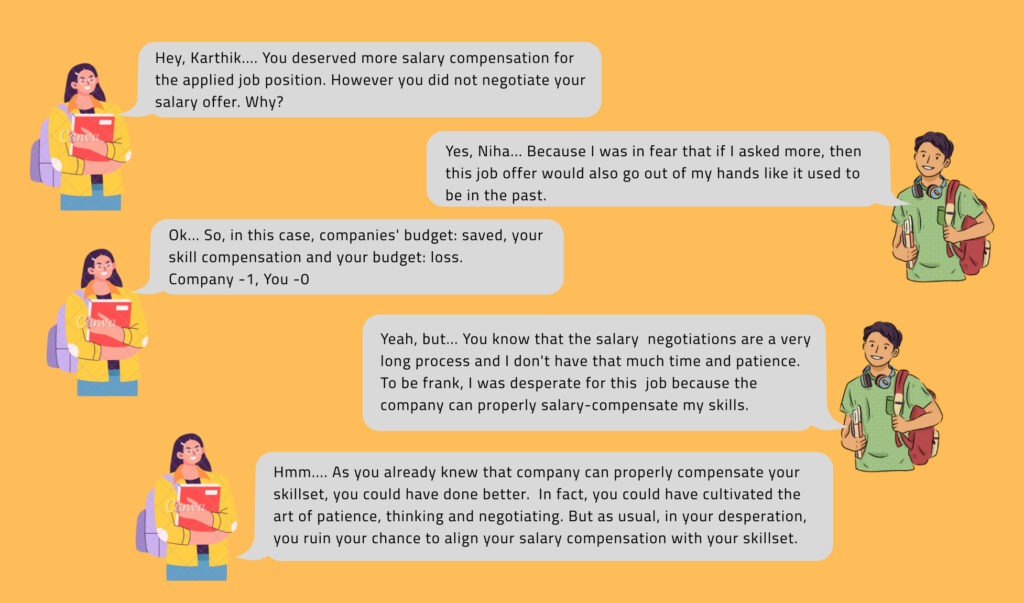Nowadays, we all know that a competitive job market is everywhere. Therefore, mastering the art of salary negotiation is crucial. Why? Considering that, it is a pathway towards career growth and financial well-being. Hence, you might be thinking that what is the point of having this convo? Well then let me shock you by taking statistics into account. Evidently, millions of fresh graduates are making their workforce debut every year coupled with billions of seasoned professionals who are yearning to advance their careers.

Often, salary negotiation processes are lengthy. A fresher, a job candidate, or a seasoned employee seeking career advancement should have a dire need to learn about how to excel in salary negotiations with a master negotiator. ‘Negotiate like your life is dependent on it.’ Chris Voss’s novel “Never Split a Difference” is quoted.
Sounds kinda familiar or have you faced one? This situation could have a different outcome or conclusion.
Therefore, a need to have knowledge of salary negotiation arises. It is a term that can make a remarkable difference in your skills compensation packages.
Under those circumstances, this blog aims to serve you essential steps and strategies that will help you to win in the salary negotiations phase. A walk-through playbook or guide or whatever you want to call it.
Understanding the Importance of Salary Negotiation:
Normally people think of a ‘salary negotiation’ is about securing a higher paycheck or having an upper hand. But, it is the wrong approach. What actually salary negotiation is? Let us tell you. A salary negotiation is about recognizing and communicating your value to the company’s potential employers. Hence, it is counted as a skill. It can be also said like a skill, which can impact earning potential throughout your career.

So, as we have understood what salary negotiation is, let’s dive into the benefits of having salary negotiation efficiency. A better compensation and enhanced job satisfaction, along with a stronger position within the company are its benefits.
But before that let’s do some…
Pre-Salary Negotiation Preparation Part 1:
- Researching Industry Salary Rates:
Before entering any negotiation, arm yourself with knowledge. It is fundamental to do so. How will it help you? Look, researching industry salary rates not only gives you a prominent leverage but also potential employers get an impression that, ‘you are not only a well-read person but also a well-researched person’. As a result, researching industry salary rates can be dissected into 2 steps:- Use salary comparison websites like Internshala, LinkedIn, Glassdoor, PayScale, or Salary.com to get a baseline or groundwork for the chosen role and demand of experience level.
- Dig into industry reports and surveys to cultivate understanding and familiarity with trends in compensation for a field of choice.
- Many Individuals can’t and won’t do hard work and homework without knowing its benefits. Consequently, what and why is it beneficial for you to research industry salary rates matters a lot. Look here are three benefits:
- It will give you a realistic range to work with
- It will help you avoid underselling or overselling yourself
- It will keep you away from setting up unrealistic expectations.

- Compare the companies salary ranges, financial parts and work locations:
Each company has its own influential factors like its size, location, and financial health that reflects its compensation structure and its salary offer flexibility. To assemble all this information, you will have…- Research annual reports or industry news of the target company’s. It will provide an enhanced look of its financial status.
- To gain more enriching insights into the company’s compensation philosophy, networking is the key especially with its current or former employees.
Pre-Salary Negotiation Preparation Part 2:
- Prepare Salary Negotiation Points:
For the specific job and company, your tailored and personalised negotiation points play a huge role. You might want to know why? It is because you are selling a brand called “YOU” and your skills as your “FEATURES” and your job experience as your “BENEFITS” to your expected employers. Now, To do this effectively:- Bang-on evaluation of job description’ key responsibilities and required skills .
- Consider hiring work location-based salary differences.
- For example:
- Amazon might offer 15 LPA for a software engineer role in Bangalore
- The same role might be offered for 13 LPA in Mysore
- In Gangtok, it could be 11 LPA for the same role.
These differences are stark reflection of variations in cost of living, cost to companies and local job markets. Tier 1, Tier 2 and Tier 3 Indian cities have salary disparities due to development issues as well.
- Use LinkedIn optimally:
LinkedIn is a valuable tool to devise your salary negotiation plan:- Connecting with professionals in similar roles helps you to gain insights into compensation trends. The more you network, the more you connect.
- Joining industry groups to stay informed about salary discussions and company cultures helps you to leverage your position, power and salary.
- LinkedIn is a thought-leadership professional platform. So, the more you put your thoughts there, there are more chances that anticipated employers hire you. Cold-calling on LinkedIn helps you a lot not only through interviews but also for salary negotiations.

Top Strategies to win in the Salary Negotiation:
Know Your Worth:
Before entering negotiations, be clear about your own priorities:
- Determine whether you’re more focused on earning potential or learning opportunities at this stage of your career.
- Set realistic expectations based on your research and the value you bring to the role.
- Always remember: The right price of your skills is to know what you want and how you rightly fit into it.
Situate yourself as a company’s asset:
Amid negotiations, it’s the core principle to shift the perspective from what you want to what you can offer:
- Assert your unique selling proposition (USP) skills and experiences that can easily and flexibly align with the company’s needs.
- Accentuating your contributions: how it can positively impact the company’s bottom line?
Use the Strategic Pause:
Throughout negotiations, silence can be a powerful tool:
- After stating your case, pause to allow the other party time to consider and respond.
- This technique can create a natural flow in the conversation and demonstrates your communication skills.
After receiving job offer, you can counter-offer via Email:
Once you receive an offer, it’s often appropriate to counter:
- Respond to the initial offer via email, allowing you time to craft a thoughtful response. (See bonus tip above).
- Present a well-reasoned counter-proposal, highlighting the excellent value you deliver to the role.
Few more strategies to win in the Salary Negotiation:
Be open and flexible:
- Flexibility can lead to a win-win outcome:
- Be open to optional compensation structures that may be more reasonable for the company.
- Reconsider non-monetary benefits like flexible working hours or additional vacation days.
Look at the bigger picture of monetary and non-monetary value:
- Always remember: Salary is just one part of your compensation package:
- Consider benefits, bonuses, stock options, and futuristic growth opportunities.
- Be prepared to negotiate on above mentioned elements if there’s limited flexibility on base salary.
Minimise Negotiation Rounds:
- To maintain professionalism and avoid strain on the relationship:
- 2+2 Rule: Employer and employee can only offer and counter offer 2 times.
- Be prepared to make a decision after the second round.
Pro Tip 💡

Avoid the temptation of ‘I negotiate first’ behaviour & Don’t negotiate too early:
- Avoid the temptation to negotiate too early in the process:
- Wait until you have a formal offer before discussing compensation in detail.
- Use the interview process to demonstrate your value, making salary discussions more favourable when they do occur. Value is more important than a skill.
- Bonus tip: Don’t negotiate your salary over a phone call. Because… you will not get enough time to formulate your offer response properly
Process of doing a salary negotiation:
Showcasing the experience and benefits:
A job candidate can refer to specific achievements of the former company during salary negotiation. A candidate should be able to connect past experience to the new role. Weaving a connection is not enough. Likewise, justification of the salary request with concrete results works as a magic because it gives an impression to potential employers that a candidate is sound and reasonable. To showcase a pragmatic side of things, always use a reference to industry standards during salary negotiations.
For example, Rita spent three years at XYZ Corp as a digital marketer with 3LPA. She showcased the benefits of hiring her to the hiring manager by saying, “I increased sales by 30% and streamlined processes that saved $100K annually. My expertise in digital marketing and project management directly aligns with this role’s requirements. Given my track record and the value I’ll bring, I’m seeking a salary of 5LPA, which is in line with industry standards for someone with my experience and skills.”
Percentage calculation:
For suppose, let’s assume the Interviewer proposed 5 LPA for some managerial role. The Candidate thought and prepared to close the negotiation for 7LPA. Here the Difference between both of them is 2 LPA, in percentage it is 40%. And why do we need to calculate the percentage before you begin the negotiation?
- If it’s <15% (A candidate can blindly accept the offer understanding there is no much difference)
- If it’s >15 % (A candidate can try negotiating job offer one more time, this time expressing all the skill set he has and along with the benefits of hiring him)
What if the negotiation doesn’t go as expected?
Can Candidate walk away in such a scenario?

This question often pops into a candidate’s mind each time. Firstly, a job candidate would ask,
“When can a job candidate walk away?”
- Let’s understand with an example first, Rina has already been working in the Customer Support role for the past 3 years with a salary of 4LPA, and now applied for another company for the role of Relationship Manager. (there is no domain change).
- So, here Rina has a pro point. She will go for more than 4 LPA. Something like 5 or 5.5LPA. If the company says no, to 5 LPA. Instead, it only provides 3 LPA. Rina walked away. (Here the company offered a lesser value salary compensation to a candidate compared to her previous salary even though there was no domain change and instead, she had domain experience, hence she rejected the offer and walked away..)
“When cannot a job candidate walk away?”
- Imagine, If a candidate is a fresher directly or a fresher to any domain that candidate has applied.
- Let’s understand in detail with an example first, Sabrina has already been working in the Customer Support role for the past 3 years with a salary of 5LPA, and now applied for another company for the role of Data Analyst. In her general search, Data Analyst was an entry-level position that offers 4 LPA. And as usual, the company too offered the same 4LPA to her.
- Here, Sabrina is not a fresher in the Customer Support role. However, she is a fresher in the Data Analyst role. So, she cannot walk away from the offer for further 2 reasons:
- Sabrina is changing her domain.
- The interviewer’s proposed salary that is accurate with the market standards.
Conclusion:
Salary negotiations can be daunting. Having said that, there is also a positive side of it. It gives you financial peace and stability. Next time, when someone tells you that, ‘salary negotiations are daunting’, ‘I cannot explore it’, ‘it is not my cup of tea’. Then, show them that they can do it by sharing this playbook blog. Because we believe, “Everyone has a right to feel empowered that too equally not just in equity”.
Read more:
All about Salary Negotiation